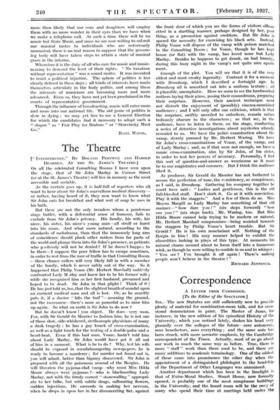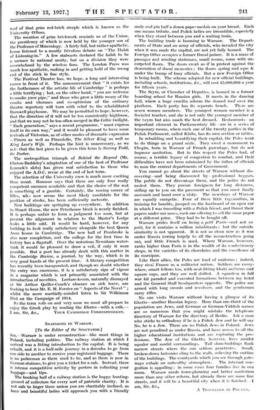Correspondence
A LEITER FROM CAMBRIDGE.
[To the Editor of the SPECTATOR.] Sia,—The new Statutes are still sufficiently new to provide plenty of material for combination-room talk, and for occa- sional denunciation in print. The Master of Jesus, for instance, in the new edition of his episodical History of the University, which you noticed lately, shakes his head very gloomily over the colleges of the future—sans autonomy, sans benefactors, sans everything ; and the same note has been struck, with more sarcastic emphasis, by the Cambridge correspondent of the Times. Actually, most of us go about our work in much the same way as before. True, there is more " staff " work than there used to be, and there are many additions to academic terminology. One of the oddest of these came into prominence the other day when the appointment of a distinguished philologist to the headship of the Department of Other Languages was announced.
Another department which has been in the limelight is that of Extra-Mural Studies. Stuart House, now formally opened, is probably one of the most sumptuous buildings . in the University, and the board room will be the envy of many who spend their time at meetings held under tho
roof of that grim red-brick steeple which is known as the University Offices.
The mention of grim brickwork reminds us of the Union, the presidency of which is now held by the younger son of the Professor of Mineralogy. A fairly full, but rather apathetic, house listened to a mostly frivolous debate on "The Habit of Listening-in." A few stalwarts declared the habit to be a menace to national sanity, but on a division they were overwhelmed by the wireless fans. The London Press was much less apathetic, rushing in and getting hold of the wrong end of the stick in fine style.
The Festival Theatre has, we hope, a long and interesting career in front of it. The announcement that " it exists for the furtherance of the artistic Life of Cambridge " is perhaps a little terrifying ; but, on the other hand, " you are welcome to smoke your pipe," and those who grow a little weary of the crooks and 'choruses and co-optimism of the ordinary theatre repertory will turn with relief to the rehabilitated Barnwell playhouse. We may be permitted to hope, however, that the direction of it will not be too consistently highbrow, and that we may not be too often merged in the Celtic twilight. " Each generation," says a recent programme, "must express itself in its own way," and it would be pleasant to have some revivals of Victorian, as of other modes of dramatic expression —Pinero as well as Pirandello, The Silver King as well as King Lear's Wife. Perhaps the hint is unnecessary, as we nuts that the last piece to be given this term is Sweeny Todd, the Barber.
' The metropolitan triumph of Behind the Beyond (Mr. Clinton-Baddeley's adaptation of one of the best of Professor Leacock's skits) has given real satisfaction to those who enjoyed the A.D.C. revue at the end of last term.
The selection of the University crew is much more exciting than usual. Rumour says that there are only four really competent oarsmen available and that the choice of the rest is something of a gamble. Certainly, the rowing career of Riles, who now seems the most likely candidate for the position of stroke, has been sufficiently meteoric.
New buildings are springing up everywhere. In addition to Stuart House, the new Peterhouse block is nearly finished. It is perhaps unfair to form a judgment too soon, but at present the alignment in relation to the Master's Lodge looks a little odd. It would be hard, however, for any building to look really satisfactory alongside the best Queen Anne house in Cambridge. The new hall of Pembroke is also near completion, and the college for the first time in history has a flagstaff. Over the notorious Newnham water- tank it would be pleasant to draw a veil, if only it were possible. But a poet has already dealt with this matter in the Cambridge Review, a journal, by the way, which is in very good hands at the present time. A literary competition has recently been inaugurated, and though we doubt whether the entry was enormous, it is a satisfactory sign of vigour in a magazine which is not primarily associated with the introduction of novelties. Lecture-lovers, naturally dismayed at Sir Arthur Quiller-Couch's absence on sick leave, are flocking to hear Mr. E. M. Forster on " Aspects of the Novel " ; whilst the more martially-minded listen to Sir Wilkinson Bird on the Campaign of 1914.
Sa the term rolls on and very soon we must all prepare to enjoy the Greek play by reading the Electra—with a crib.— I am, Sir, &e., YOUR CAMBRIDGE CORRESPONDENT.











































 Previous page
Previous page